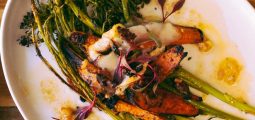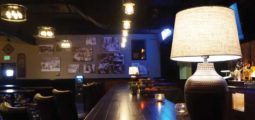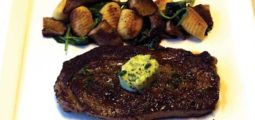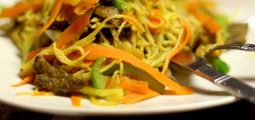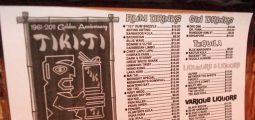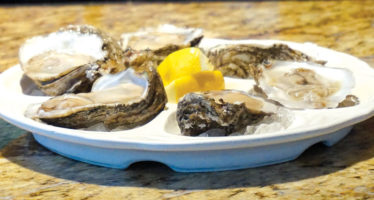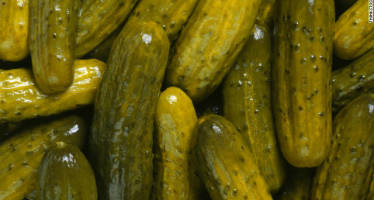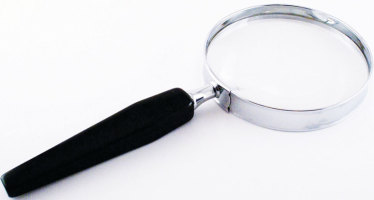Doing Things the Dario Way Nets Omaha Two of its Most Distinctive Restaurants
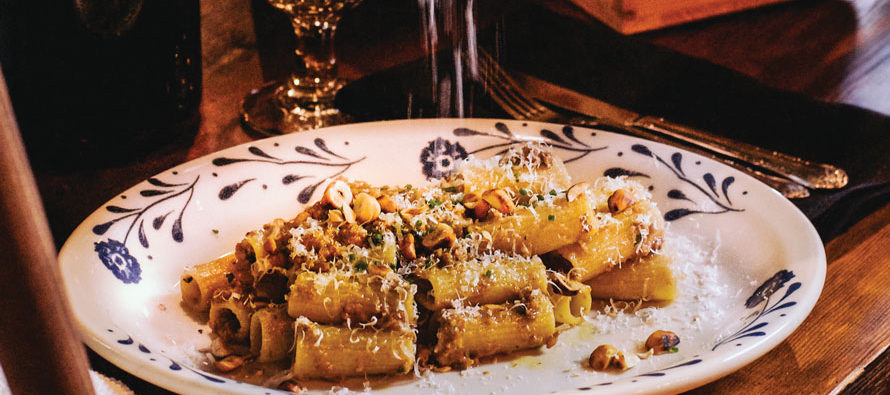
Half measures don’t cut it with Dario Schicke, the Bosnian chef-owner who bears a striking resemblance to Alec Baldwin. Schicke’s helped raise the Omaha culinary scene through a pair of Dundee restaurants dedicated to distinct, authentic European cuisines.
His Dario’s Brassiere and Avoli Osteria, located within a block of each other on Underwood Avenue, represent unique concepts at the upper end of casual fine dining. Dario’s features a French and Belgian-influenced menu complemented by imported beers. Avoli features northern Italian fare paired with wines of the region.
Each eatery contributes to Dundee’s foodie haven reputation. Though widely acclaimed, including a James Beard nomination for Dario’s, they were risky niche ventures made more risky by Schicke adamantly sticking to his vision. He admits he used to be even “more hardcore” demanding things be done his way but he’s relaxed some since putting together systems and staff that execute his vision.
His stubborn refusal to compromise makes sense when you understand all he went through to earn the right to do things his own way. He fled his homeland at age 20 only a few months after the Bosnian War erupted. His refugee experience began in Croatia before he moved to Germany and reunited with fellow refugees who could work but couldn’t travel. He met his wife Amy, a native of Kearney, Nebraska, at a Munich beer house where he worked.
He grew up in a restaurant family in Sarajevo. While surviving in Germany he worked various food jobs. Then he and Amy moved to New York City, where they soon took over a Greek deli that sold imported beers he set about studying. That search led him to train at the French Culinary Institute and he used those skills to transform the deli into a French bistro. The couple planned moving to the south of France when Amy got pregnant. The first of their two daughters was born in NYC. Amy got pregnant again. Then 9/11 happened – with the twin towers collapsing less than a mile away. The business suffered and the trauma led Amy and the girls to resettle in Omaha while a shell-shocked Schicke tried salvaging the business, then searching for a buyer until recouping his investment and joining his family here.
He briefly worked at the French Cafe before landing at the Market Basket. His classically prepared chef dinners found enough of a following that he and Amy invested everything they owned in order to open Dario’s. Its staple entrees and beers set it apart. For less adventurous diners it proved too much an outlier.
“At the beginning it wasn’t easy. I can’t tell you how many people would look at our menu and just walk out,” Schicke said. “We didn’t sell anything but Belgian beers and that was unheard of at the time. We lost a lot of business but it was the only way I could push our waiters and front of house staff to learn about those beers. All those beers didn’t exist in Nebraska. We had to special order them.”
Some customers resisted the hefty prices but he explained these hearty brews are far different than even domestic crafts. Besides, he argues, you get more for your money at Dario’s.
“Nobody has a problem paying $6 or $7 for a glass of so-so house wine with their meal, but in this case you get 11 ounces of the best of the best beer.”
People who tried it, invariably liked it. The same with the well north of $10 burger and fries, “I knew our burger and fries were going to be a hit because they’re delicious, but if we sold that for $6.99 that’s all we were going to sell. We had duck breast and scallops and mussels and crepes and chicken and pork chops. We brought our sandwich and entree prices as close as we could so we didn’t turn into a burger joint. But even if you order a hamburger you’re still going to get brasserie service – you’re going to get bread and butter, a huge beer glass and water glass, both hand-washed and polished. You’re going to get all that, plus fries, for $14. Our fries are hand-peeled, hand-cut, soaked in water overnight, then blanched. You get what you pay for. There was nothing to compare to it at the time.”
He recalled a disgruntled customer who complained about a burger, fries and beer costing nearly $30 with tax.
“This guy told me, ‘I’m not happy.’ I was like, ‘Sorry.’ Two days later the same guy came in, even angrier, saying, ‘Damn it. I couldn’t stop thinking about that burger and fries.’ Exactly. So we just stuck with our passion and now the culture has caught up with us.”
Then, with Avoli, he filled a local gap in northern Italian food. In keeping with that cuisine’s tenets, there’s no pizza or lasagna or spaghetti on the menu, rather a curated selection of fresh, homemade and imported dry pasta dishes.
“Both of our places are focused on a region in Europe and that’s what we’ve stayed true to from day one. Dario’s ten years now and three and a half years with Avoli. We don’t change for any trends or influences. That was the idea. As a chef and restaurant owner I really want to commit to the style and region we’re going to represent. We don’t want to deviate in any way.”
He couldn’t have created more different eateries.
“They are so opposite, these two restaurants, that I can’t even mix a single person working in both places,” Schicke said. “Everything about them is different. There’s no overlapping menu items. I went so extreme even our security companies and computer systems are different. I didn’t want to open a second Dario’s – I wanted to start something new.”
Besides, he said, “the only way for me to step outside of Dario’s was to do something else.” With Dario’s already well-established and having a “great crew there,” he devotes more of his hands-on time to supporting Avoli with its complex menu and larger kitchen and dining room. But he still starts and ends every night at his namesake spot, Dario’s.
He, Amy and friends did the interior designs of both places themselves.
“It’s very personal to us. Why pay somebody a lot of money to tell you what you like?”
Schicke’s passion for getting thing right and his hunger for always learning new things finds him taking off to hone his craft. To prep for Avoli, he said, “I went to Italy and worked in a whole bunch of Italian restaurants because I wanted to do it right. I wanted to do what today’s Italian food is. So I went all the way down deep, from product to menu to how people eat, what they eat, how they source and how we translate that in Omaha.”
There are no fussy fusions at his restaurants. The dishes are created using the same ingredients and preparations as in Europe.
“At Avoli we use only Prosciutto di Parma and Prosciutto di San Daniele. We don’t cut our Parmesan, we get a wheel of Parmesan every few months that’s about 95 to 110 pounds. It’s like a $1,200 to $1,400 piece of cheese. That’s what we use exclusively. When we grate our parmesan it’s like snowflakes and it just melts into the pasta. It’s a huge difference. We use certified olive oils. We went out and sourced authentic Italian olive oils. We get double zero flour from Italy. San Marzano tomatoes, farm fresh eggs. That’s what we do.”
He acknowledges his ability to adhere to such standards is made possible by the independence he maintains.
“I’m really lucky I have people at home supporting me because it could easily be a situation where partners say, “we could be making a lot more money serving something else.’ But we don’t have investors – we don’t have a lot of people involved. I don’t have anybody telling me what to do.”
If he took shortcuts, it would only spoil things for this perfectionist and traditionalist.
“I do this for passion but also you have to make a living doing it. I have a family to raise, I have a house. You have to be able to build a life around it. It’s exciting and challenging. Running a restaurant, dealing with business aspects, being creative and cooking every day for two places, not easy, and a lot of times not fun. To mix all that in one bowl, it’s rough. That’s when those Belgian beers come in handy.
“Raising teenage girls – I need stronger than Belgian beer to get over that,” he said, laughing.
In the restaurant business there’s no option but to be committed,
“There’s too many moving parts, it’s too expensive,” he said. “Our art is probably the most expensive art in the world. We have to have heat, air conditioning, plumbing, electrical, insurance, all this stuff to practice our art. You need like a thousand bucks a day to practice, so you have to be smart about it. I tell people, if you don’t have passion, just don’t do it, and do something else.
“Otherwise, you’ll get burned out.”
He said the success of his restaurants is simply a function of “our crazy passion and not giving up – we just do what we do and I’m very proud of what we’ve done.”
Even though both places feature staples that never change, Schicke allows himself and his chef’s freedom to experiment with new dishes. He recently introduced Avoli staff and diners to Croatian pasta.
“You make like a bread dough, roll it really thin, and then bake it. Then you break it into pieces and cook it like pasta, so it’s twice-cooked pasta that has like a bread quality. We’re going to serve goose and the dried pasta is going to be rehydrated and cooked in those goose juices, with Chestnuts and all that stuff. That’s my comfort food.”
Some inspiration is tied to the seasons. At Avoli, for example, he said, “You get to the summer and it’s all about great olive oil, vinegars, tomatoes, basil. You can’t help it. But as soon as it gets colder, the nights are a little longer, that’s when I shine with flavorful marinades and braises. A little more complex food – using less expensive ingredients and making them luxurious,”
Meanwhile, he’ll keep pushing his skills by guest working in kitchens.
“It’s fun, it keeps me excited, I learn to do things better. Then I come back here torturing everybody with what I saw.”
Dario’s Brasserie
4920 Underwood Ave.
Tuesday-Saturday Dinner: 5-10 p.m.
Saturday Brunch: 11:30 a.m.-2 p.m.
Sunday Brunch: 10 a.m.-2 p.m.
Sunday Dinner: 5pm-Close
402-933-0799
Avoli Osteria
5013 Underwood Ave.
Tuesday-Saturday Dinner: 5-10 p.m.
Sunday Dinner: 5 p.m.-Close
402-933-7400
Visit www.dariosbrasserie.com and www.avoliosteria.com.

Leo Adam Biga
Leo Adam Biga is an Omaha-based author-journalist-blogger. His books include Alexander Payne: His Journey in Film, Crossing Bridges: A Priest's Uplifting Life Among the Downtrodden and Memories of the Jewish Midwest: Mom and Pop Grocery Stores. The University of Nebraska at Omaha graduate contributes articles to newspapers and magazines. His work has been recognized by his peers at the local, regional and national levels. Sample his eclectic writing at leoadambiga.com or www.facebook.com/LeoAdamBiga.
Related Articles
SamFam, Herbe Sainte Team Has Their Sights Set on More
SamFam, LLC, the team behind recently opened New Orleans-influenced restaurant and bar, Herbe Sainte, has their sights set on two
On the Menu: Pickles
Homemade condiments give food at several restaurants an extra kick. Here are some restaurants that offer homemade pickles on their
Finding the Food: Between Lincoln and Omaha
Having grown up in a small town in Northern Minnesota, I always remember going out to eat as getting in
No comments
Write a commentOnly registered users can comment.
